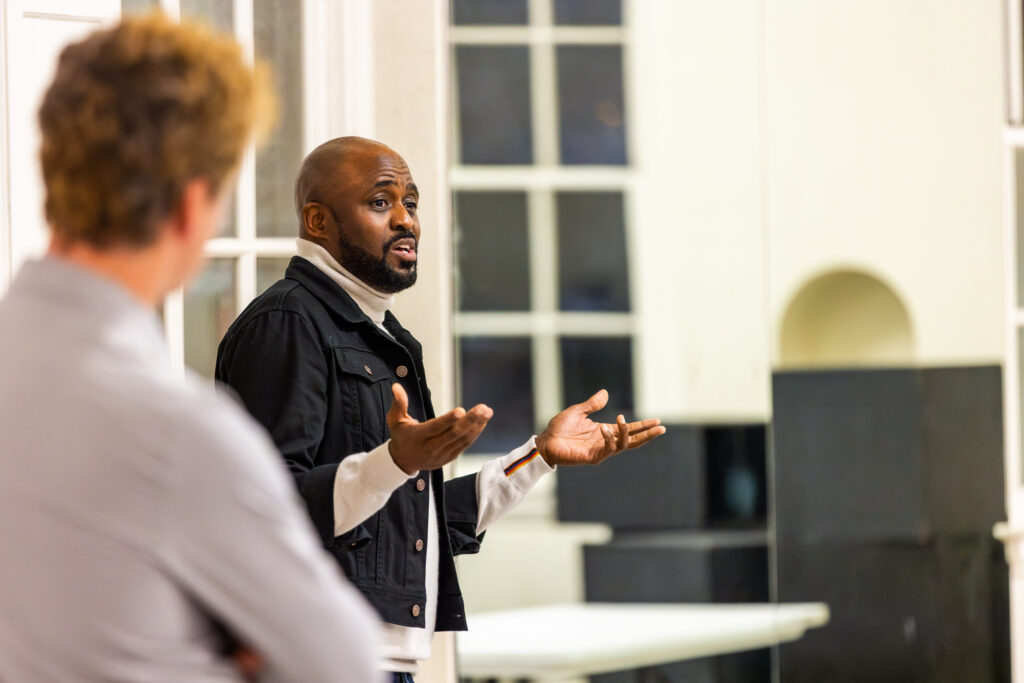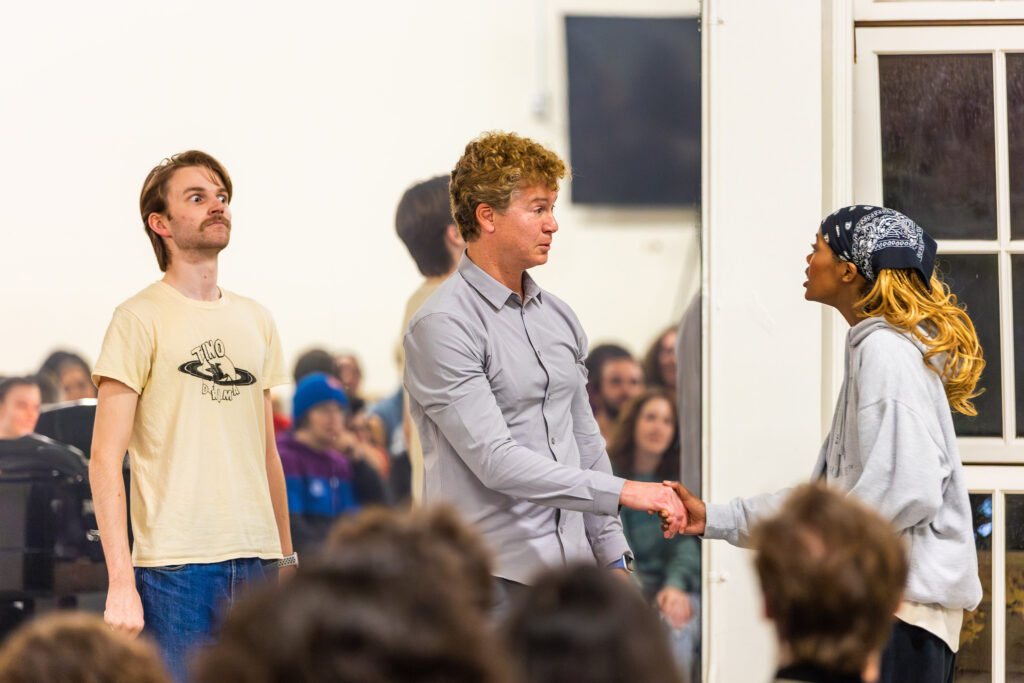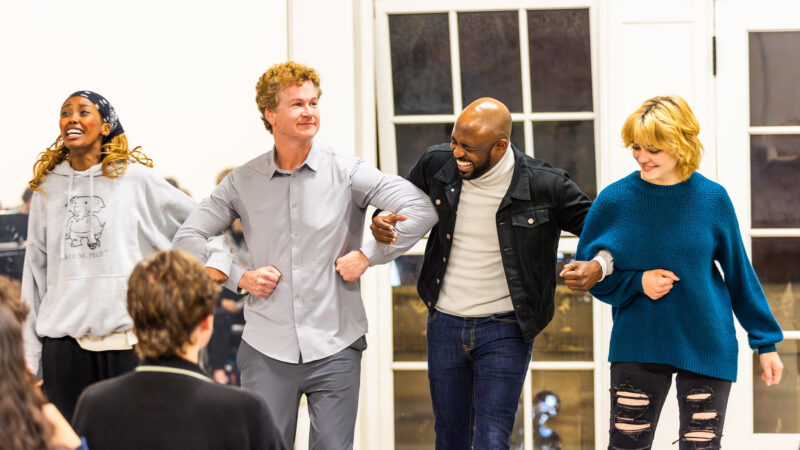There was music. There was laughter. There were rival lemonade stands locked in a fierce battle to secure an investment from Mr. Smith, the wealthiest man in town.
And it was all made up on the spot.
The musical about rival lemonade stand owners was the culmination of a masterclass led by improv legend Wayne Brady hosted by the USC School of Dramatic Arts (SDA). For two hours, more than one hundred USC students were entertained and instructed in musical theatre improv by a teacher who may be the most qualified man on earth to merge these seemingly disparate theatrical traditions.
Junior Finn Rollings (BA Cinema and Media Studies ’25) understood the value of the opportunity.
“To interact with Wayne Brady, who’s on the Mount Rushmore of improv and is sort of the figurehead of musical improv, was amazing,” he said.
Brady, perhaps most well-known for his long run as a cast member on the hit improv comedy show Whose Line Is It Anyway?, is also a prolific and award-winning television host, actor and musician. In addition to hosting The Wayne Brady Show, Fox’s Don’t Forget the Lyrics! and Let’s Make a Deal, Brady also performed as Simon in the Tony Award-winning musical Kinky Boots, and recurred as James Stinson on How I Met Your Mother. This month he also opened The Wiz on Broadway, starring in the eponymous role. He is a five-time Emmy Award winner and was nominated for a Grammy Award. Brady is a member of Freestyle Love Supreme, an improvisational hip hop group combining hip hop, musical theatre and comedy in which he collaborates with Hamilton creator Lin-Manuel Miranda, among others. His success in the realms of improv comedy and musical theatre made him an ideal figure to teach an improv musical comedy workshop to USC students.
“He’s just a wonderful performer, comedian, singer and actor,” said Neema Muteti (BFA Musical Theatre ’26). “His improv abilities are so unique in this field. Especially because of how he’s built a really solid foundation in this industry through this skill.”
When Muteti heard that Brady would be combining improv comedy and musical theatre in his workshop, she knew she had to get involved.
“Musical theatre improv from the king himself,” she laughed. “I have to be in the room, at least!”

The workshop, led by Brady, longtime collaborator and fellow Whose Line Is It Anyway? cast member Jonathan Mangum, and musical accompanist Greg Nabours, consisted of three parts. In the first part, Brady told the story of how he came to improv and laid the groundwork for those new to improvised musical theatre, including various rules and guidelines foundational to the form. In the second part, he interacted more with the audience and expanded on these rules, giving generous feedback to participating students. Finally, Brady, Mangum and three students—including Muteti and Rollings—performed a fully improvised musical about feuding lemonade stand owners, putting everything they had learned into practice.
Interim director of the BFA Musical Theatre program and Assistant Professor of Theatre Practice in Musical Theatre MaryAnn Hu was delighted by the interactive and educational nature of the workshop.
“I thought it was well structured in the sense that they outlined it very clearly and made it accessible to students who have never done improv before,” Professor Hu said. “They made it a fun experience for everyone by demystifying any expectations and really breaking it down into basics.”
Muteti and Rollings agreed.
“Wayne and Jonathan were good about lifting people up, because it’s very intimidating in front of a room of your peers,” Muteti said. “It was really fun because everyone in the room was rooting for us to succeed. They wanted us to come up with something to move the story forward.”
“The coolest thing when I was improvising with Wayne and Jonathan was that throughout our scenes, they were really cognizant of pitching their improv partners softballs, which was indicative of their style as improvisers and instructors,” Rollings said. “They took their moments to shine but also let the students interact and shine.”

While musical theatre and improv may not immediately seem like a natural pairing, Brady was able to show how the two traditions feed naturally into one another. For musical theatre performers, improv is a way to keep one’s mind sharp, to react well when things go wrong, to flex creative muscles and to be present in the moment. For improv performers, musical theatre is a collaborative experience that provides a natural opportunity for improvisational storytelling and comedy.
“The role that music plays in improv is—there’s something communal about music,” said Rollings, who, in addition to studying theatre, is a member of USC’s independent improvisational troupe Commedus Interruptus. “There’s something that’s inherently connective about music. Just a beat can connect people. I feel they’re both team sports. I’ve never seen a one-person improv troupe.”
Muteti, who recently played the role of Mimi Marquez in SDA’s production of RENT, agreed.
“I think improv is important to performance in general, because not everything always goes according to plan,” Muteti said. “If you’re completely lost when something doesn’t go right, there’s no way to move forward. This relates to literally anything that you could do performing onstage: in a band, doing stand-up comedy, doing a play or a musical. Things can always go wrong.”
Professor Hu, who, in addition to being an accomplished educator and performer is also a certified mindfulness and meditation coach, emphasized the importance of being present when performing in musical theatre, and the role that practicing improv can have in establishing that presence.
“It forces you to think and respond on your feet because it’s not pre-planned. You don’t know what’s going to come up,” Professor Hu said. “The integration of music and improv is about listening and responding. It invites you to be present. You can’t endgame something when you don’t know what’s going to happen. That element is exciting.”
Everyone appreciated the interactive elements of the workshop, the supportive environment created by Brady, Mangum, and the other performers, and the opportunity to learn from a true master in the field.
“Really and truly, this is why I’m at USC and this is why I’m at SDA,” Rollings said. “Experiences like this are so valuable to the students. It was a blast.”
